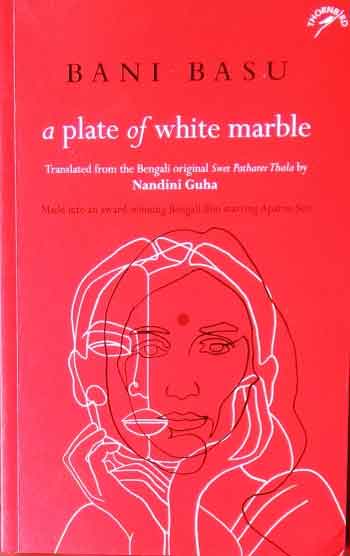
“The house at Number 45 Shyambazar Street had its date of construction engraved right at the top of its façade. From this, it could be learnt that the house was not built in this century. If not a hundred, it was close to eighty-five years old. Thanks to the moist winds from the holy Ganges in its close proximity and the salty winds from the Bay of Bengal within 105 kilometers to the south, houses in Kolkata do not survive as long as the rich, traditional manor houses of England do. However, first-class materials from the British companies — marble, pillars, arches, tiles, original Burma-teak windows, doors, rafters, and the limestone-layered, twenty-inch-thick brickwork — continued to ostentatiously preserve the antique glory of these homes till today. This carefully polished old heritage, going by the name of ‘aristocracy’, may well be called stiff-necked orthodoxy, with all its evil fallout.” These are the opening lines of the novel A Plate of White Marble (Swet Patharer Thala) by Bani Basu.
One of the most versatile contemporary writers in Bengali, academician, poet, novelist, essayist, critic, and translator of eminence, Basu writes on diverse topics ranging from history and mythology to society, psychology and gender. From Sri Aurobindo’s poems along with two volumes of Somerset Maugham’s stories to a volume of D.H Lawrence’s stories, there is a huge readership of her work. Janmabhumui-Matribhumi (Motherland), Antarghat (The Enemy Within), Maitreya Jatak (The Birth of Maitreya), Kharap Chhele (Dark Afternoons), Pancham Purush( Fifth Person ) are some of her other novels.
Translated into English by Nandini Guha – retired Associate Professor of English at University of Delhi and a well-known translator of some seminal Bengali novels – A Plate of White Marbles brings to a wider audience the imperious social concerns.
First published in 1990 in the original Bengali, A Plate of White Marble tells the tale of the ‘new woman’ of an era that just witnessed the independence of a nation. Bandana, the protagonist, though grieves over her husband’s early death, never conforms to the social subtext and ideals of ‘widowhood’, thanks to her uncle. She dares to begin her life afresh in every possible sense. But, the road proves to be full of thorns as she gradually faces bitterness from many quarters of the society. The only thing she clings to is her son, but once that anchor too is lost, she leaves behind the safe concrete walls of what she used to consider ‘home’, only to work for a far greater cause—she joins a children’s home to work for those who need her the most.
Post her husband’s demise, the Bhattacharjee family is left grappling with the aftershock of the loss and the new set of “rules and rituals of widowhood” that she has to follow — a life devoid of colors, sweetmeats and celebrations.
Savor these lines of Bandana’s mother-in-law and her appearance! “Serving Atap-rice on the plate from a small saucepan, the middle-aged, heavily built mother-in-law suddenly broke into wails. One-fourth of her hair had turned grey. A broad streak of vermilion was visible in the broad parting of her hair. She was in an artistically woven, red-bordered sari, with three rows of the traditional temple pattern. She would wear nothing but these colorfully bordered saris. Her arms were full of loudly jangling gold bangles, wristlets, and the special wedding bangles of iron and conch shell.”
But for the young widow, the kind of stuff in the house were cruelly painful: “The prescribed meal of a widow’s broth of boiled rice, potato, and green banana — just would not go down Bandana’s throat today. Combined rage, mortification, and a sense of disgrace caused the food to turn into a coagulated lump in her throat.”
The novel has a riveting description of the Bengal countryside: “The early morning cacophony — the clangor from the local tube well as its handle rose and fell, the clang of utensils being scoured, the swish of brooms and the hoarse voices of housewives issuing orders and instructions — touches such a quarrelsome decibel that neither the Vedic hymns nor the tuneful Rabindrasangeet, in a grave baritone, or soft tenor, can find a way through, sadly beating a hasty retreat.”
As times go by, Bandana’s Kaka (uncle)visits her and unable to withstand her deteriorating health, he takes his neice and her son Roop to their maternal home, leaving House number 45 Shyambazar Street behind and shunning the absurd sacrificial rituals for women.
Through Bandana, the status of woman in an old-fashioned Bengali society comes to the fore. It also portrays how they’re rendered miserable and are arbitrated for their choices, when they try to break free from stereotypical shackles. Published thirty years ago, the novel hasn’t lost its appeal because the same old shenanigans bring into being even today.
A Plate of White Marble has several dimensions: how even an educated and modern woman is helpless when she is widowed at a tender age 0f twenty-seven; how she is forced to lead a life of austerity as a “virtuous widow“, by her in-laws and how she eventually comes out of the shackles and stops confirming to the conformist traditions that were forced upon her. Even when she begins to live a new life, she had to face difficulties, though she bravely fights the battle for a liberated life.
The plot of the novel is captivating and inspiring. The characters, the backdrop, and the portrayal are entrancing. The translation has impeccably captured the essence of Bandana’s numerous roles; a wife, a daughter-in-law, a widow, and a mother who is hell-bent on bringing up the child even if it meant sacrificing one’s own comforts.
Bani Basu’s original novel and the translation magnificently throws light on the age-old customs, the gender-based discrimination in a patriarchal society that doesn’t allow women to come out of the shadow of a man, the superstitions within and outside the homes.
A Plate of White Marble has a touching story to tell and it weaves the narrative fabulously.
Title: A Plate of White Marble
Author: Bani Basu, translated from Bengali by Nandini Guha
Publisher: Niyogi Books, 2020
Bhaskar Parichha is a Bhubaneswar-based journalist and author. He writes on a broad spectrum of subjects , but more focused on art ,culture and biographies. His recent book ‘No Strings Attached’ has been published by Dhauli Books.
Originally published by Borderless Journal
SIGN UP FOR COUNTERCURRENTS DAILY NEWSLETTER













































